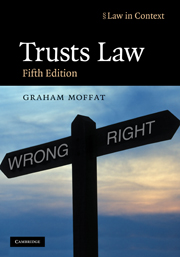Book contents
- Frontmatter
- Contents
- Preface to the fifth edition
- Acknowledgments
- Table of abbreviations
- Useful websites
- Table of statutes
- Table of statutory instruments
- Table of cases
- 1 Trusts introduced
- 2 The evolution of the private express trust
- 3 Taxation, wealth-holding and the private trust
- 4 Creating the trust – I
- 5 Creating the trust – II
- 6 Trusts and public policy
- 7 Flexibility in relation to beneficial entitlement
- 8 The taxation of private trusts
- 9 An introduction to trustees and trusteeship
- 10 Aspects of the management of trusts
- 11 Trusteeship, control and breach of trust
- 12 Implied trusts and the family home
- 13 Trusts in commerce I: occupational pension schemes
- 14 Trusts in commerce II: commerce and equitable remedies
- 15 Trusts in commerce III: commerce, credit and the trust
- 16 Trusts in commerce IV: fiduciary relationships, commerce and the trust
- 17 Trust, contract and unincorporated associations
- 18 An introduction to the law of charity
- 19 A legal definition of ‘charity’
- 20 The regulation of charities
- Index
13 - Trusts in commerce I: occupational pension schemes
- Frontmatter
- Contents
- Preface to the fifth edition
- Acknowledgments
- Table of abbreviations
- Useful websites
- Table of statutes
- Table of statutory instruments
- Table of cases
- 1 Trusts introduced
- 2 The evolution of the private express trust
- 3 Taxation, wealth-holding and the private trust
- 4 Creating the trust – I
- 5 Creating the trust – II
- 6 Trusts and public policy
- 7 Flexibility in relation to beneficial entitlement
- 8 The taxation of private trusts
- 9 An introduction to trustees and trusteeship
- 10 Aspects of the management of trusts
- 11 Trusteeship, control and breach of trust
- 12 Implied trusts and the family home
- 13 Trusts in commerce I: occupational pension schemes
- 14 Trusts in commerce II: commerce and equitable remedies
- 15 Trusts in commerce III: commerce, credit and the trust
- 16 Trusts in commerce IV: fiduciary relationships, commerce and the trust
- 17 Trust, contract and unincorporated associations
- 18 An introduction to the law of charity
- 19 A legal definition of ‘charity’
- 20 The regulation of charities
- Index
Summary
Introduction
Commerce and the trust
The focus in this book has so far been on the use or imposition of the trust in various family contexts. It was often in response to problems posed in these contexts in particular that many of the basic rules of trusts law evolved. Some rules, for example, those relating to duties concerning investment and delegation, indirectly provide guidelines for commercial decisions to be taken during administration of a trust. But the trust concept has today also penetrated more directly into many and varied areas of commercial and financial activity (see Chapter 1 at p 9). In this chapter our focus shifts to one of those areas where the trust retains a significant role, namely collective saving for retirement via occupational pension provision. This is not to say that the trust does not feature significantly in other areas of commerce and finance. In the form of the ‘unit trust’, a hybrid creation comprising a complex amalgam of the concepts of common law contract and equitable trust, it provides a medium of collective investment for investors who wish to spread their risks over a wide range of securities (see Chapter 1). Recent estimates put the total number of unit trusts at closer to 1,800 with a market value in the region of £350 billion (thousand million) (Financial Statistics no 561, January 2009, Table 5.3D).
- Type
- Chapter
- Information
- Trusts LawText and Materials, pp. 669 - 712Publisher: Cambridge University PressPrint publication year: 2009



